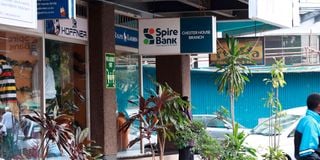Premium
Equity buys struggling teachers-owned Spire Bank in breakthrough deal

Spire Bank branch on Koinange Street in Nairobi on May 29, 2020.
Equity Bank has bought Mwalimu Sacco’s Spire Bank, handing a lifeline to the financially struggling lender.
Equity Bank (Kenya) Limited, a subsidiary of Equity Group Holdings, yesterday said it signed an assets and liabilities purchase agreement for the buyout of certain assets and liabilities of Spire Bank Limited.
In the transaction, Equity has acquired approximately 20,000 customers of Spire Bank holding Sh1.3 billion deposits.
In addition, Equity Bank will acquire approximately 3,700 loan customers of Spire Bank who have outstanding loan balances of about Sh945 million.
“We feel honoured to extend a hand of partnership to teachers with whom we have had a long and strong relationship. With the 20,000 teachers who we will be inheriting from Spire Bank, Equity will become home to over 100,000 teachers spread throughout the country and accessing our services through our branches, our agent network and digital banking channels,” Equity Group CEO James Mwangi said.
Records show that currently, Equity processes a total monthly remittance of Sh1.8 billion in teachers’ salaries. An estimated 43,000 teachers have borrowed loans worth Sh33 billion from Equity with a monthly repayment of Sh800 million.
“ In view of Spire Bank’s current market position, the board of directors is of the view that this development is in the best interest of Spire Bank’s customers and shareholders,” Spire Bank board chairman William Rahedi said.
In its unaudited half-year financial report as of June 2022, Spire Bank reported total customer deposit liabilities of Sh1.93 billion and net loans and advances to customers of Sh1.74 billion. It also reported statutory loan loss reserves of Sh800 million that reduce the net loan and advances after applying statutory loan loss provisions of Sh945 million.
The Equity deal marks a major relief for Spire Bank, which has been surviving on emergency loans from the Central Bank of Kenya.
A recent report by the National Assembly’s Finance committee revealed that Spire Bank has largely relied on CBK support through the reverse repo facility to keep its operations going.
Reverse repos are commonly used by CBK to advance short-term capital to businesses during cash flow challenges. They involve the purchase of government securities by the CBK from commercial banks.
“In order to mitigate its liquidity constraints, the bank has been borrowing from the Central Bank of Kenya through the reverse repo to stabilise its operations,” Mwalimu National Sacco chief executive Kenneth Odhiambo said in a submission to the committee.
Spire Bank has been unable to access cash from peer banks due to its financial challenges, pushing to pursue a turnaround plan pegged on lower costs, loan recoveries, and conversion of shareholder deposits into equity.
The bank cut its half-year net loss by 21 per cent to Sh403 million. It reduced losses from Sh512.8 million in June last year on far-reaching cost-cutting measures that reduced interest and operational expenditure.
Interest expense declined from Sh221 million to Sh85 million on the conversion of Sh3.4 billion deposits to equity while operating expenses declined seven per cent to Sh470 million.
The teachers’ bank has been unable to lend due to low capital ratios that have seen its loan book shrink from Sh2.3 billion to Sh1.7 billion.
The bank whose capital ratios are below the mandatory CBK requirements has, however, seen an improvement in its core capital from negative Sh4.1 billion in June last year to currently negative Sh1.7 billion due to the deposit to equity conversion.




